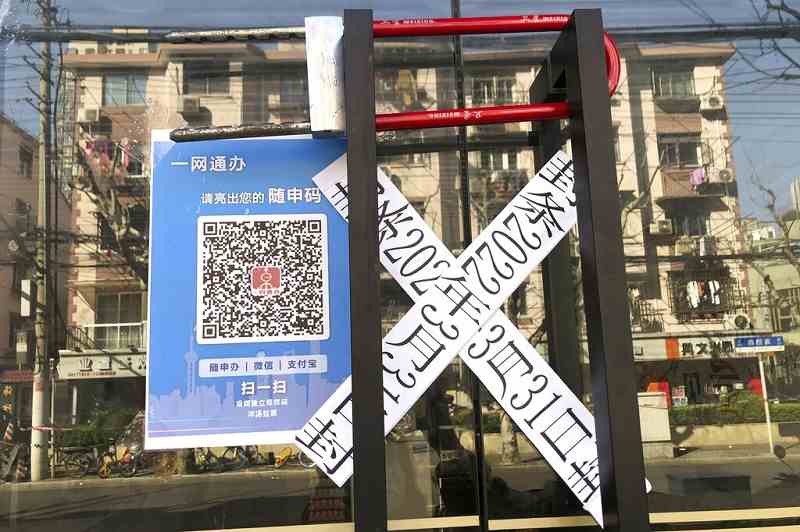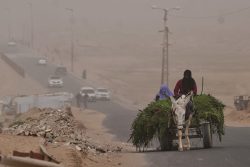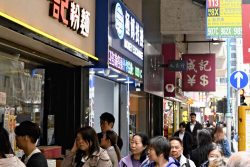
The entrance to a noodle store is locked and sealed in the Jingan district of western Shanghai, Monday, April 4, 2022.
17:54 JST, May 16, 2022
BEIJING (AP) — China’s factory and consumer activity fell even more than expected in April under anti-virus controls, official data showed Monday, but a Cabinet official said the economy is reviving as anti-virus curbs ease and its commercial capital of Shanghai reopens.
The slump in the second-biggest economy fueled fears global manufacturing and trade might be disrupted after most business in Shanghai were shut down and its 25 million people confined to their homes starting in late March. That adds to complications for President Xi Jinping in a year when he is expected to try to extend his time in power.
Retail sales tumbled 11.1% from a year ago after shops, restaurants and other consumer outlets in Shanghai and other cities closed, according to the National Bureau of Statistics. Manufacturing sank 2.9% as factories closed.
This month’s activity appears to be improving based on high power demand and more freight being moved, Fu Linghui, the bureau’s statistics chief, said at a news conference. He said about half of the 9,000 biggest industrial enterprises in Shanghai were back at work as outbreaks in China’s biggest city were contained.
“We believe the operation of the economy is gradually improving,” Fu said. “The pace of recovery in consumption will accelerate as the impact of the epidemic is brought under control.”
The ruling Communist Party is trying to reverse a deepening slowdown without giving up “zero-COVID” tactics that also have shut down sections of Beijing and other major cities to isolate every infected person. Economists cut this year’s growth forecasts to as low as 2%, well below the ruling party target of 5.5% and last year’s 8.1% expansion.
“There is still considerable uncertainty and downside risk to the near-term outlook for China if new Covid-19 outbreaks should occur in other major urban areas,” said Rajiv Biswas of S&P Global Market Intelligence in a report.
The economy already was weak before the latest outbreaks after Beijing cracked down on debt in its vast real estate industry that Chinese leaders worry is dangerously high. That triggered a slide in construction and home sales, industries that support millions of jobs.
China kept case numbers low through early this year with a strategy that shut down cities of tens of millions of people. That prompted complaints about the soaring human and economic costs, leading the ruling party to shift to closing off buildings or neighborhoods with infections. But with thousands of new cases reported every day, that led to big sections of Beijing and other cities being shut down.
Dozens of areas of Beijing, Shanghai and other cities are deemed high- or medium-risk in a list issued Sunday by the National Health Commission, which requires shops and some other businesses to close. The other cities include Shenjiang in the south, Guang’an in the southwest and Harbin, Dandong and Yingkou in the northeast.
Ruling party leaders said after a May 5 meeting that containing outbreaks would take priority over the economy.
Chinese officials have called for the virus to be brought under control ahead of a ruling party meeting in October or November at which Xi is expected to try to break with tradition and award himself a third five-year term as leader.
The economy grew by an anemic 4.8% over a year earlier in the three months ending in March. That was an improvement over the previous quarter’s 4.1%, but forecasters say activity in the three months through June might weaken.
Shanghai, China’s richest city, will gradually reopen shopping malls, vegetable markets, hair salons and other businesses starting Monday, the government announced.
A deputy mayor, Zong Ming, said the number of people in Shanghai who are barred from leaving their homes has fallen below 1 million, according to the official Xinhua News Agency. Zong said Sunday the number of commercial outlets operating in the city had increased to 10,625 from a low of 1,400.
Also Sunday, the central bank said the lower limit on interest rates for mortgages taken out by first-time homebuyers will be lowered in a new effort to revive plunging home sales.
“Provided that the virus situation continues to improve, the economy should begin to rebound this month,” said Julian Evans-Pritchard of Capital Economics in a report. “But the recovery is likely to be tepid.”
Top Articles in News Services
-

Prudential Life Expected to Face Inspection over Fraud
-

Hong Kong Ex-Publisher Jimmy Lai’s Sentence Raises International Outcry as China Defends It
-

Japan’s Nikkei Stock Average Touches 58,000 as Yen, Jgbs Rally on Election Fallout (UPDATE 1)
-

Trump Names Former Federal Reserve Governor Warsh as the Next Fed Chair, Replacing Powell
-

Suzuki Overtakes Nissan as Japan’s Third‑Largest Automaker in 2025
JN ACCESS RANKING
-

Japan Institute to Use Domestic Commercial Optical Lattice Clock to Set Japan Standard Time
-

Israeli Ambassador to Japan Speaks about Japan’s Role in the Reconstruction of Gaza
-

Man Infected with Measles May Have Come in Contact with Many People in Tokyo, Went to Store, Restaurant Around When Symptoms Emerged
-

China Eyes Rare Earth Foothold in Malaysia to Maintain Dominance, Counter Japan, U.S.
-

Prudential Life Insurance Plans to Fully Compensate for Damages Caused by Fraudulent Actions Without Waiting for Third-Party Committee Review
























